| Wednesday, 14 January 2026 Home • About Us • Contact Us |
 | |
|
|
|
You are here:
Home /
Articles
Mail to a Friend • Printer friendly 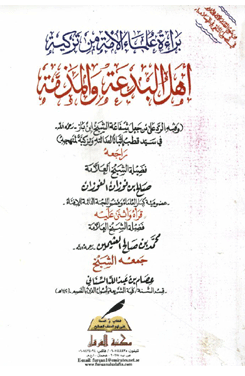 Baraa'ah Ulamaa il-Ummah Min Tazkiyah Ahl il-Bid'ah wal-Mudhammah Baraa'ah Ulamaa il-Ummah Min Tazkiyah Ahl il-Bid'ah wal-Mudhammah To the right is the cover for the second edition of "Baraa'ah Ulamaa il-Ummah Min Tazkiyah Ahl il-Bid'ah wal-Mudhammah" (The Innocence of the Scholars of the Ummah from the Commendation of the People of Innovation and Censure). This book was prepared by Isaam bin Abdullaah as-Sinaanee. It contains a refutation of the one who used the intercession of Shaykh Bin Baaz (rahimahullaah) for Sayyid Qutb as a proof for the 'adaalah (integrity) of Sayyid Qutb and commendation of his (Qutb's) manhaj, when it is not a proof at all. The book, after compilation and authorship was sent to Shaykh Saalih al-Fawzaan who checked over it and made recommendations, and also suggested an improvement to the title of the book. Then it was read by Imaam Muhammad bin Saalih al-Uthaymeen (rahimahullaah), who made his own written notes on the pre-print copy that was sent to him, and he also advised that the section titled "The Salafi Manhaj", should be placed before "The Qutubi Manhaj" and not after it, unless the author had a specific reason for doing that. And images of these hand-written notes are included at the end of the book. We will be quoting from this book inshaa'Allaah in this series. Both of these scholars endorsed the contents of this book and the purpose for which it was to be published and distributed. And the purpose is clearly outlined in the title of the book itself. Namely, to declare the Scholars of Ahl us-Sunnah free and innocent (in particular Imaam Ibn Baaz, and the other scholars in general) of having made tazkiyah (i.e. given adaalah) to those who are from the people of innovation: In this case Sayyid Qutb, who aside from writing his commentary on the Qur'an upon an Ash'arite creed, added other great calamities, some of which are serious enough that they cannot really be excused by mere ignorance, such as accusing the Scribe of the Prophet (alayhis salaam) the Uncle of the Believers, Mu'awiyah - whose integrity is attested to by the Prophet himself - of treachery, deception and hypocrisy. And this book essentially sunk their ship, leaving them only the flotsam to hold onto thereafter, which is what they have been doing since then.
Between the Salafi Manhaj and the Qutubi Manhaj
In previous articles we documented how both Shaykh Muhammad bin Saalih al-Uthaymeen and Shaykh Saalih al-Fawzaan checked, approved and commended the contents of the book "al-Baraa'ah" and in particular we mentioned the section at the end in which the author, Isaam bin Abdullaah as-Sinaanee, included a section contrasting the Salafi Manhaj with the Qutbi [Leninist] Manhaj. Refer to the previous two articles here:
As promised, the translation of this section is now provided below to see exactly what these Scholars, read, approved of, and recommended its distribution with the purpose of clarifying the truth and warning from falsehood. The Section Here are the pages in question:
Two Ways That do Not Meet, How Different They Are, Between the East and the West The First: The Salafi Manhaj Imaam Ibn Baaz said [responding to the claim that the activists of Algeria had alleged he supported them and advised them to take up arms]:
Source: Cassette Recording on 26th Dhul-Hijjah, 1414H, being an exposition of the forgery of Salman al-Awdah against Imaam Ibn Baaz - refer to Madaarik un-Nadhar (pp. 346-348 2nd Edition). Imaam al-Albaani said, [in words that uncovered the great fabrication and pusillanimous claim of Salman al-Awdah against him (In the cassette "Kalimat Haqqin Fee Mas'alat il-Jazaa'iriyyah") that the noble Shaikh supported the activities of the revolutionaries in their Qutubi manhaj in Algeria]:
And Imaam al-Albaanee also stated in the message he sent to the leaders (of the various parties) in Algeria:
This occurs in his letter dated, 19 Jumaadah al-Aakhirah 1412H and the a photocopy of this letter can be found in Madarik un-Nadhar (pp.335-336 2nd edition). Shaikh Ibn Uthaimeen was asked,
The Shaikh replied,
The questioner said,
The Shaikh replied:
In a cassette recording Shawwaal, 1414H, and also quoted in Madaarik un-Nadhar The Second: The Qutubi Manhaj Sayyid Qutb says (az-Zilaal 2/1057):
Sayyid Qutb also says (az-Zilaal, 4/2122),
And he said also (az-Zilaal 3/1451):
Link to this article: Show: HTML Link • Full Link • Short Link Related Articles:
You must be registered and logged in to comment. |


|
|||||||||||||||||||||||||||||||||||||||||||||||||
|
|
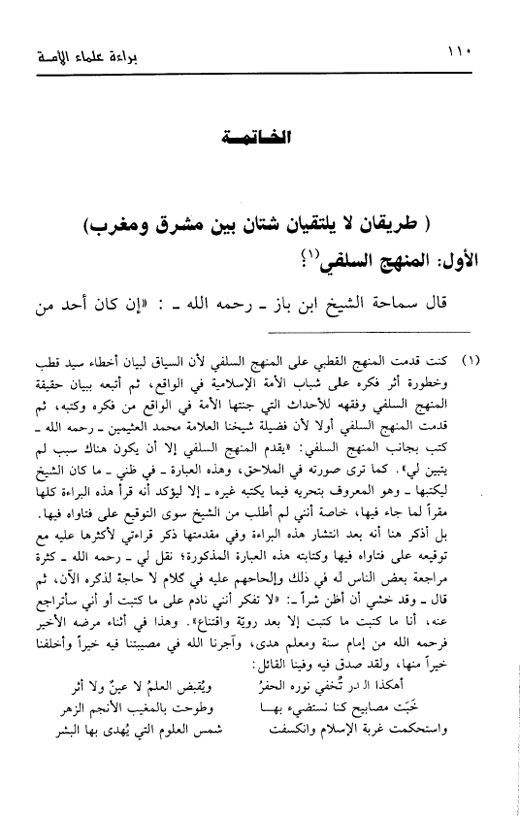
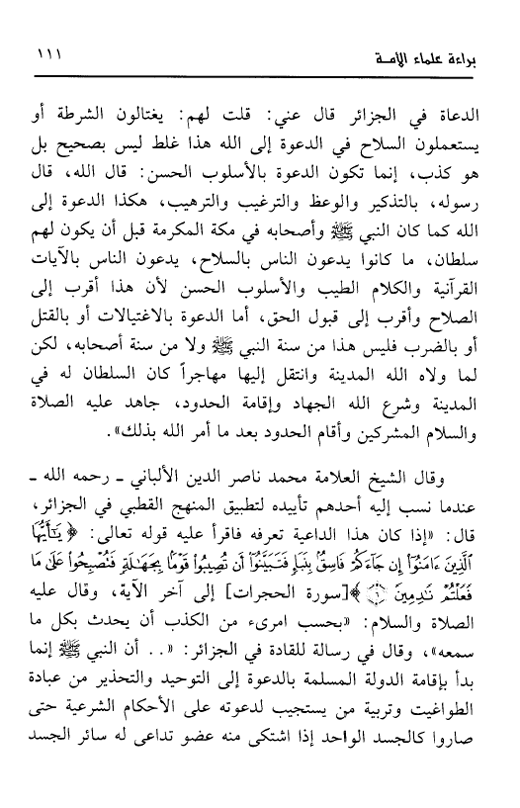
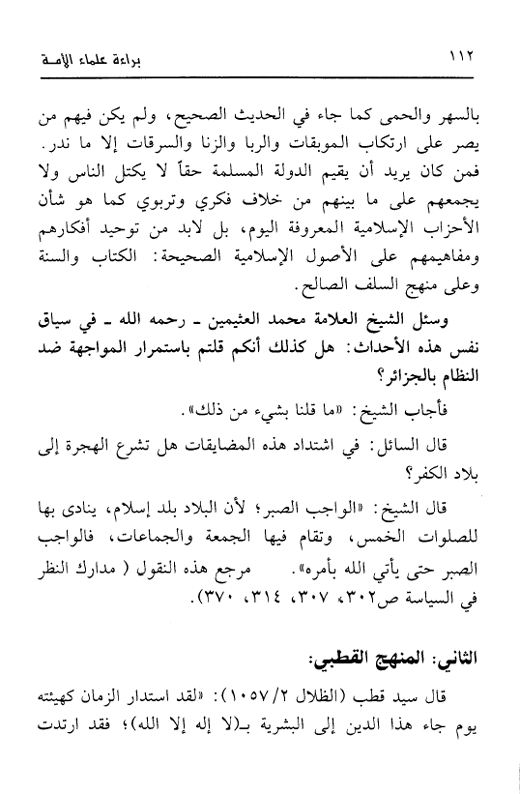
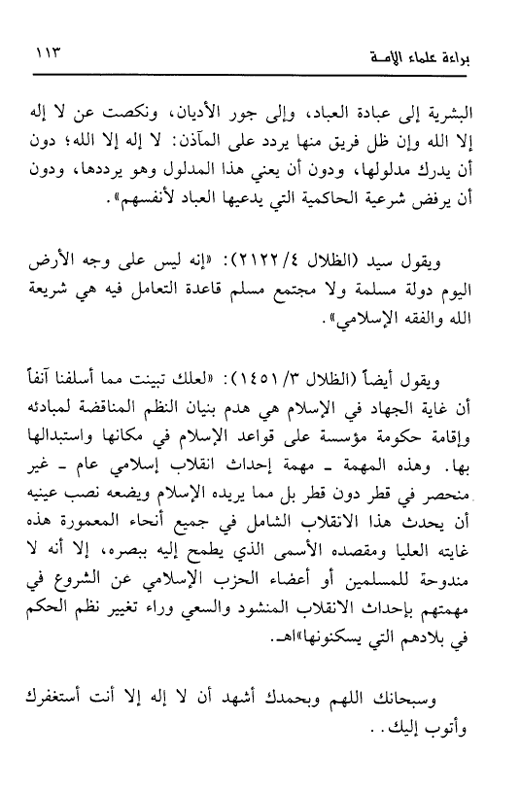
 If one of the Algerian du'at (callers) had said about me that I had said to them, "They should assassinate the police or that they should take up arms in their call to Allaah then this is an error and is not correct. Rather it is a lie. The Call to Allaah occurs with good mannerisms, "Allaah said, the Messenger said". It occurs with reminders, admonition, encouragement and discouragement. This is how the Call to Allaah takes place, just as the Prophet (sallallaahu alaihi wasallam) and his companions were in al-Makkah al-Makarramah before they had any power or authority. They did not used to call the people to take up arms, rather they called them with the verses of the Qur'aan, good words, and good mannerisms, since all of that is closer to rectification and is closer to the acceptance of the truth. As for calling with assassinations, killing, fighting and the likes, then that is not from the Sunnah of the Prophet (sallallaahu alaihi wasallam) and nor is it from the Sunnah of his Companions. However, when Allaah gave him control over Madinah and when he emigrated to it, he had authority and power in Madinah and then Jihaad was legislated as well as the establishment of the
If one of the Algerian du'at (callers) had said about me that I had said to them, "They should assassinate the police or that they should take up arms in their call to Allaah then this is an error and is not correct. Rather it is a lie. The Call to Allaah occurs with good mannerisms, "Allaah said, the Messenger said". It occurs with reminders, admonition, encouragement and discouragement. This is how the Call to Allaah takes place, just as the Prophet (sallallaahu alaihi wasallam) and his companions were in al-Makkah al-Makarramah before they had any power or authority. They did not used to call the people to take up arms, rather they called them with the verses of the Qur'aan, good words, and good mannerisms, since all of that is closer to rectification and is closer to the acceptance of the truth. As for calling with assassinations, killing, fighting and the likes, then that is not from the Sunnah of the Prophet (sallallaahu alaihi wasallam) and nor is it from the Sunnah of his Companions. However, when Allaah gave him control over Madinah and when he emigrated to it, he had authority and power in Madinah and then Jihaad was legislated as well as the establishment of the